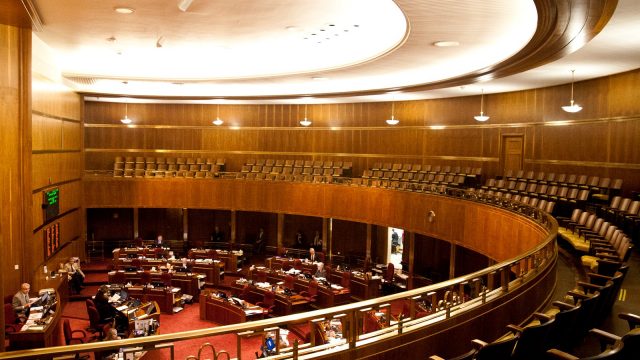Does North Dakota Need A Full Time Legislature?

North Dakota is one of just four states with a legislative branch that does not meet every year. In this state, the Legislature is constrained by the state constitution to meeting for only 80 days every biennium, and must meet in regular session for the first time after election day no earlier than January 11th.
Not everybody is happy with this arrangement. Some lawmakers have told me in the past that they find it hard to do their jobs when they’re in session for such a short amount of time. They feel it’s easy for full-time bureaucrats to bamboozle part-time lawmakers. “They have two years to prepare to fool us for 80 days,” is the expression I often hear.
There are also concerns among lawmakers about a restrained Legislature simply ceding too much power to the executive branch.
These concerns aren’t new. Generations of lawmakers have shared them, and the argument which has always won out holds that it is important for North Dakota to have truly citizen lawmakers. If the Legislature is in session for more days, many lawmakers feel they simply couldn’t serve as they wouldn’t be able to justify the time off from their day jobs. They fear that a longer session, or yearly sessions, would encourage only professional politicians and activists to run.
Yet with North Dakota riding the economic wave of an oil boom, there is a new concern. Some are saying that the Legislature simply can’t keep up with the rapidly growing state’s needs, which is something the Voice of America report above addresses.
But is the case for a longer legislative session, or a full-time Legislature, compelling?
In the story, Williston Public Schools Superintendent Viola LaFontaine claims that the state’s two-year budgeting cycle isn’t fast enough to meet her growing enrollment:
Superintendent Viola LaFontaine says she’s dealing with a surge of new students on a budget outdated by at least a year.
“So if I get 300 more kids this year, I don’t get paid for them until the following year,” she said. “There’s a year lapse when you get reimbursed for your students. So I have to come up with all the funding now to support my students I have in the system.” …
Williston Superintendent Viola LaFontaine is one of those people.
“Maybe they need longer sessions than what they do,” she said. “Some people say ‘yeah they’d be better to meet every year.’ I think just make better decisions on the two years you’re there! And help out western North Dakota.”
The problem, of course, is that I’m not sure LaFontaine or many local officials like her are credible on this topic. A couple of years ago, before the 2011 Legislative session, the Williston School District was sounding the alarms about an impending enrollment crisis, but when the school year started estimates for enrollment growth were off by 80 percent.
There’s the rub.
While the oil boom has created very real needs, and very real challenges, many bureaucrats and lobbyists have begun using oil impacts as a trump card to get their way. They exaggerate and hype. They work the media, always hoping to pressure the appropriators in Bismarck to shell out more money.
That’s why school officials inflate enrollment estimates. That’s how we have ended up with oil patch cities crying poverty when it comes to funding infrastructure, cops and schools while simultaneously building a lavish water park (with indoor surfing!) on the public’s dime.
That’s how hockey rinks and swimming pools suddenly become “critical infrastructure.”
And if you question these things, you are accused of being insufficiently concerned about western North Dakota and oil impacts.
Much is made of how state leaders are handling the oil boom, but there is far less scrutiny on how local leaders are responding. That’s unfortunate, because there is a lot of opportunism and rank politicking going on which deserves to be exposed.
We hear about “local control” often in North Dakota politics, and it’s almost universally agreed that the best government is the government closest to the people. But a push for a full-time Legislature – ironically from those who are supposed to be in control locally – is an affront to that notion. With local control comes local responsibility, but far too often local leaders just want the state to give them money while taking all the responsibility.
We should fix that before we do anything with how often, and for how long, the Legislature meets.




